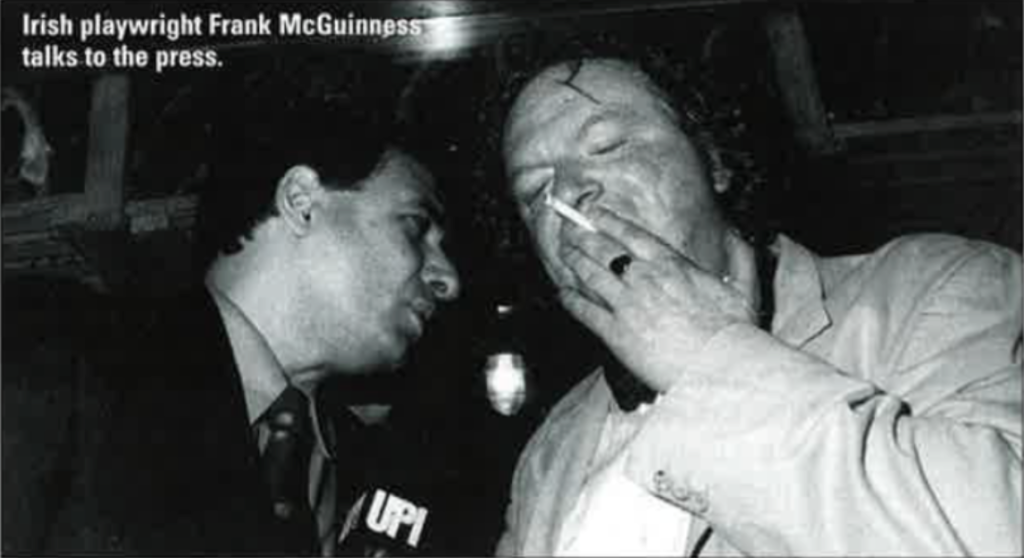Frank McGuinness, whose adaptation of Ibsen’s A Doll’s House won four Tony Awards, talks to Patricia O’Haire.
It would be hard to miss Frank McGuinness lumbering into a room.
Curly red-hair that looks as if it had never, in all its life, been introduced to a comb, a curly red beard to match, he’s tall and somewhat overweight, but he gives off an air of nervous energy that both preceds and follows him and reaches out so much that everyone in the restaurant at New York’s Fitzpatrick Hotel interrupts their lunch to look up and buzz about who he is.
Well they should. McGuinnesss is a man to reckon with.
First of all, he’s a playwright. His adaptation of Henrik Ibsen’s A Doll’s House was so popular in London last year that several Broadway producers rushed across the ocean to see it. But they were too late. Bill Kenright, who produced it in London, probably had Broadway in mind the whole time, and when it opened — at the out-of -the-way Belasco Theater — the reviews were so positive that the lines started forming at the box office early in the morning of the day they appeared. The production went on to win four Tony Awards: Best Revival of a Play, Best Actress in Play, Best Featured Actor in a Play and Best Director.
McGuinness takes it all in stride. “Great, isn’t it?” he says, a big grin cracking his face in half. He was in New York to look in on his baby “Doll,” but couldn’t stay long, though. “Have to get back to work.” His work — besides the playwriting and scriptwriting, is teaching. He’s a lecturer in Medieval Studies at St. Patrick’s University, part of Maynooth in Dublin.
Besides that, he’s just completed the script for the film of Brian Friel’s prize-winning play, Dancing at Lughnasa, and watched over his adaptation of Bertolt Brecht’s The Caucasian Chalk Circle, which opened in London at the same time A Doll’s House opened here. “Couldn’t make both,” he said. “And A Doll’s House was well on its feet while the Brecht hadn’t opened. Had to make a choice and London was closer.”
“But I knew I’d be in New York sooner or later.”
Between A Doll’s House, Caucasian Chalk Circle, Lughnasa and a highly-acclaimed version of Chekhov’s The Three Sisters, starring the three daughters of the noted actor, Cyril Cusack, it would seem as if McGuinness was an adapter rather than an original playwright. Mention that, and his breath intake quickens.
“I know it might seem that way, but that’s not the case at all.” He’s right. His first Broadway show, in 1993, was Someone Who’ll Watch Over Me, which starred Alec McCowan, James McDaniel (now on TV’s NYPD Blue) and Stephen Rea (from The Crying Game). It picked up a Tony nomination and won the New York Critics’ Circle Award for Best Foreign Play and the Writer’s Guild Award for Best Play.
But before that, he had written what is now considered a cult classic. Observe the Sons of Ulster Marching Towards the Somme was shown at the Abbey Theater in 1985. When it moved to London the following year, McGuinness won the London Standard’s Most Promising Playwright Award among others. It was recently revived at Dublin’s Abbey Theater and “Maybe,” he says with a grin, “just maybe, will be seen in New York next year or the year after.” Where? “At the Brooklyn Academy of Music, I believe.”
“I don’t know that I ever expected to be a playwright,” he says. “I come from a small town in Donegal, not too far from where Brian Friel lives, and when I finished college, I wasn’t sure what to do. But I saw an ad in a magazine about a playwriting course given by Patrick Mason, who now runs Dublin’s Abbey Theater.’
“You were supposed to submit a play you had written by a certain date to be eligible. Well of course, I hadn’t written anything then, so instead I sent a letter saying I was a very poor student and couldn’t afford a typewriter but I had an idea for a play and could I be considered anyhow.
“Well, they wrote back and said they understood, and they would extend the deadline for me and please send my script as soon as possible. Well, I did have an idea — that was true — so a couple of friends and myself spent a whole weekend taking turns at the typewriter and finally I got to send it off.”
“And I won a scholarship.”
It was a start. He took the course, wrote The Factory Girls in 1982 and Patrick Mason directed it for the Abbey. Once started, he couldn’t be stopped. Since then, plays and scripts have rolled off his keyboard faster than speeding bullets. And awards — he’s even bought a house in Dublin, the better to store his awards.
Look at his record: adaptations of Lorca’s Yorma, Ibsen’s Rosmersholm, Uncle Vanya and Peer Gynt, Three Sisters, his version of Brecht and Kurt Weill’s Three-Penny Opera, starring Marianne Faithfull. Hedda Gabler, starring Kelly McGillis, opened at New York’s Roundabout Theater in 1994.
Original plays include Innocence, based on the life of the artist Caravaggio, Carthaginians, Mary and Lizzie, The Bird Sanctuary and Baglady. For the BBC, he’s written Henhouse and The Breadman. And as for films, besides Dancing at Lughnasa, he’s also done Rebellion.
Would you believe the man is still only 46 years old?


Leave a Reply